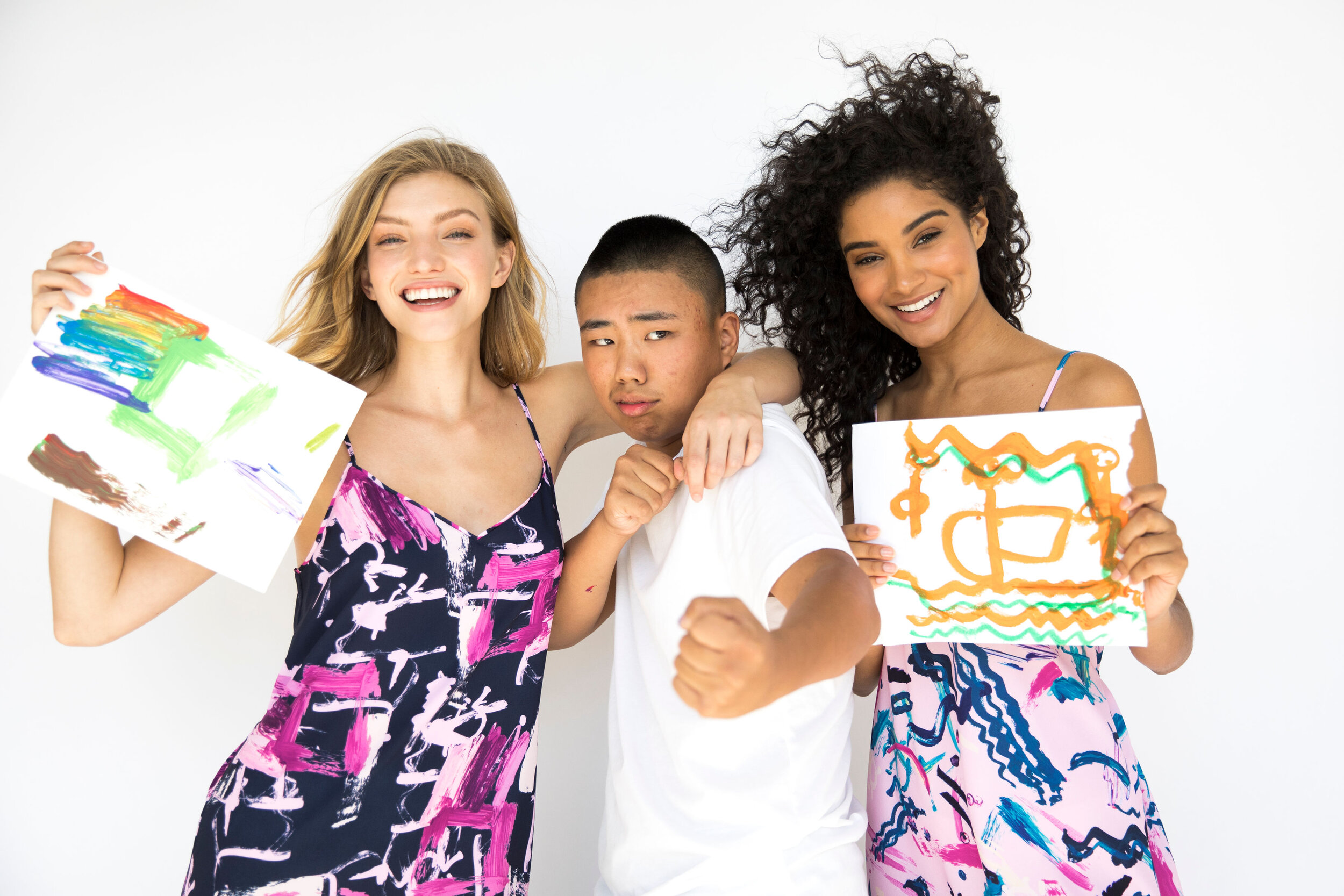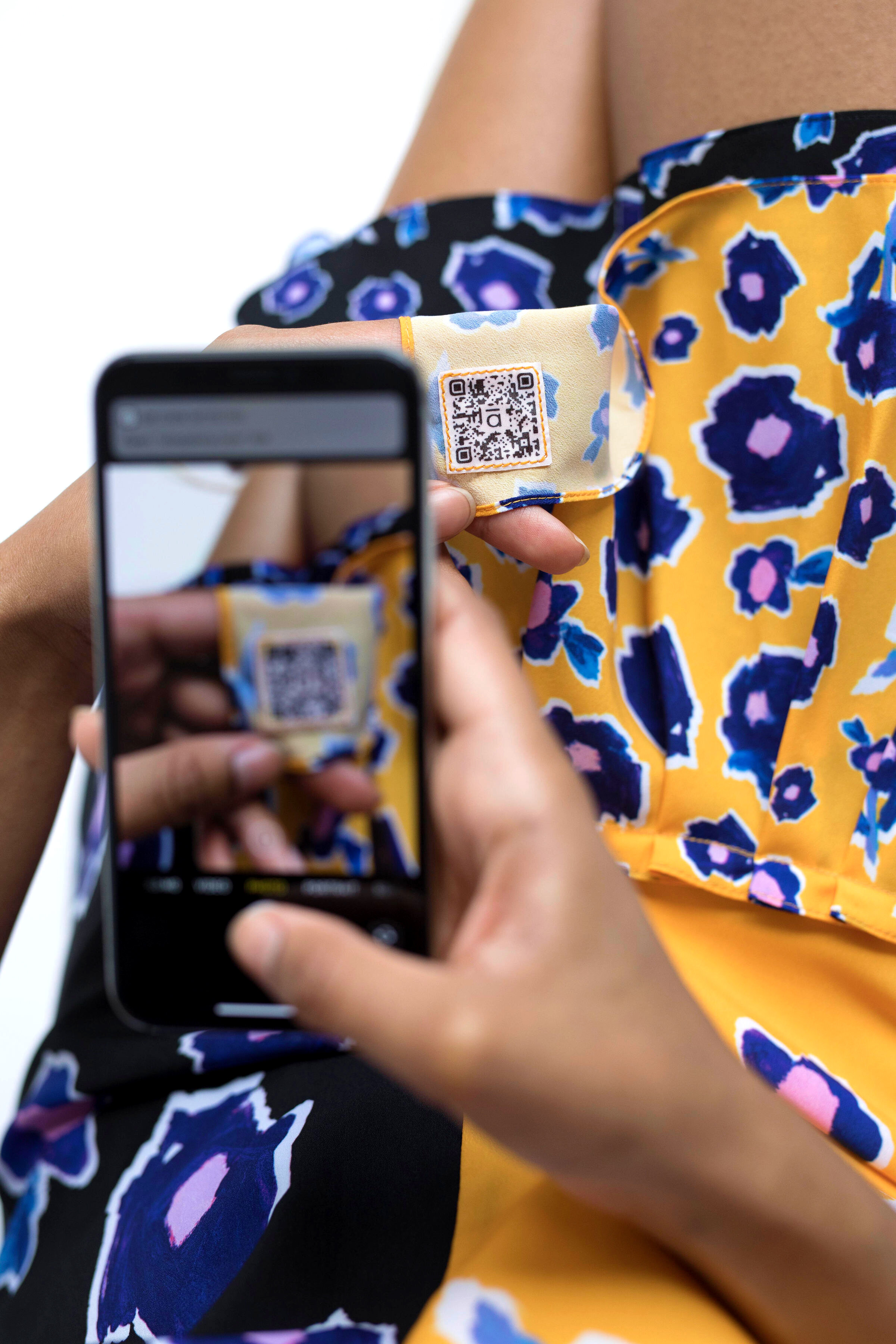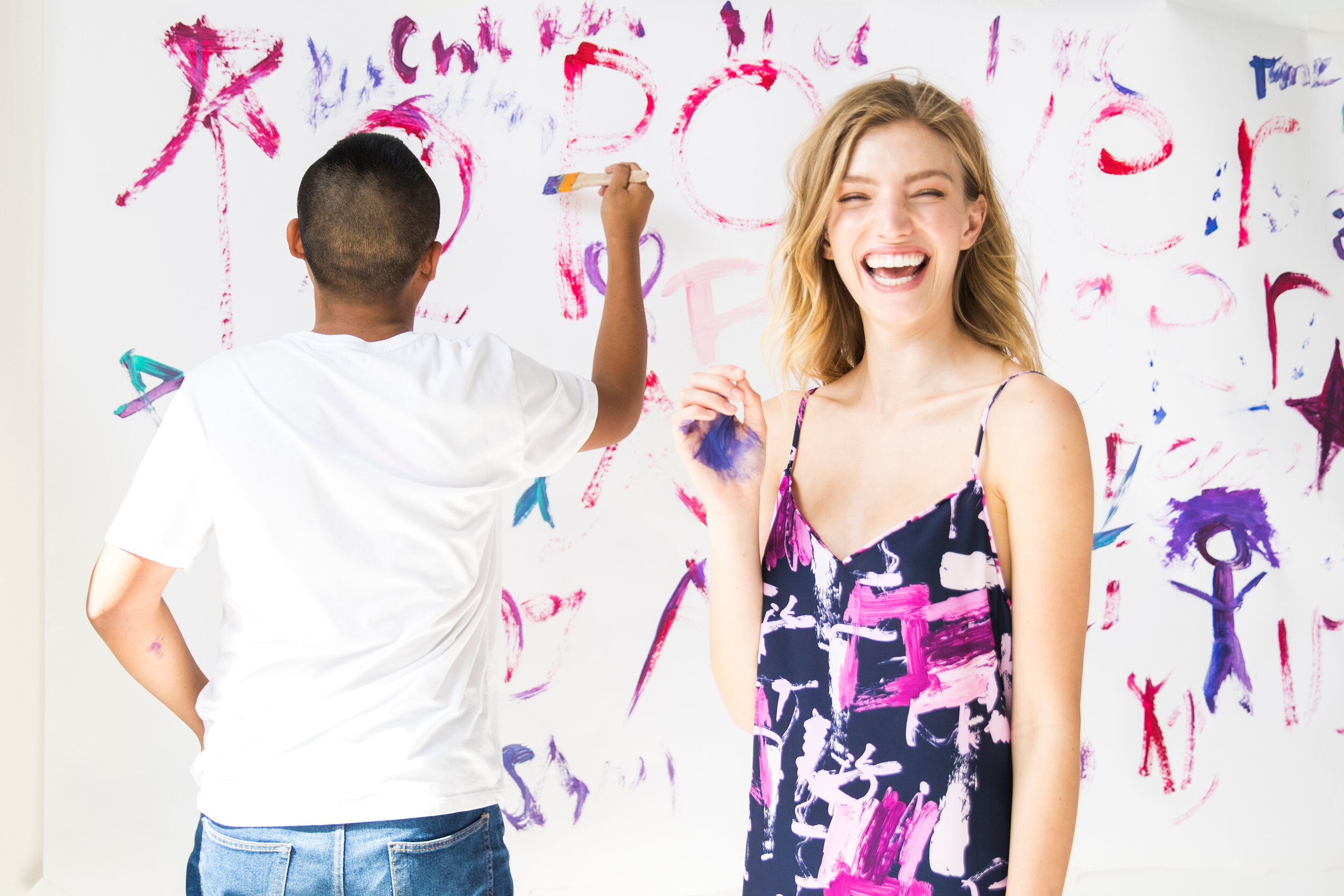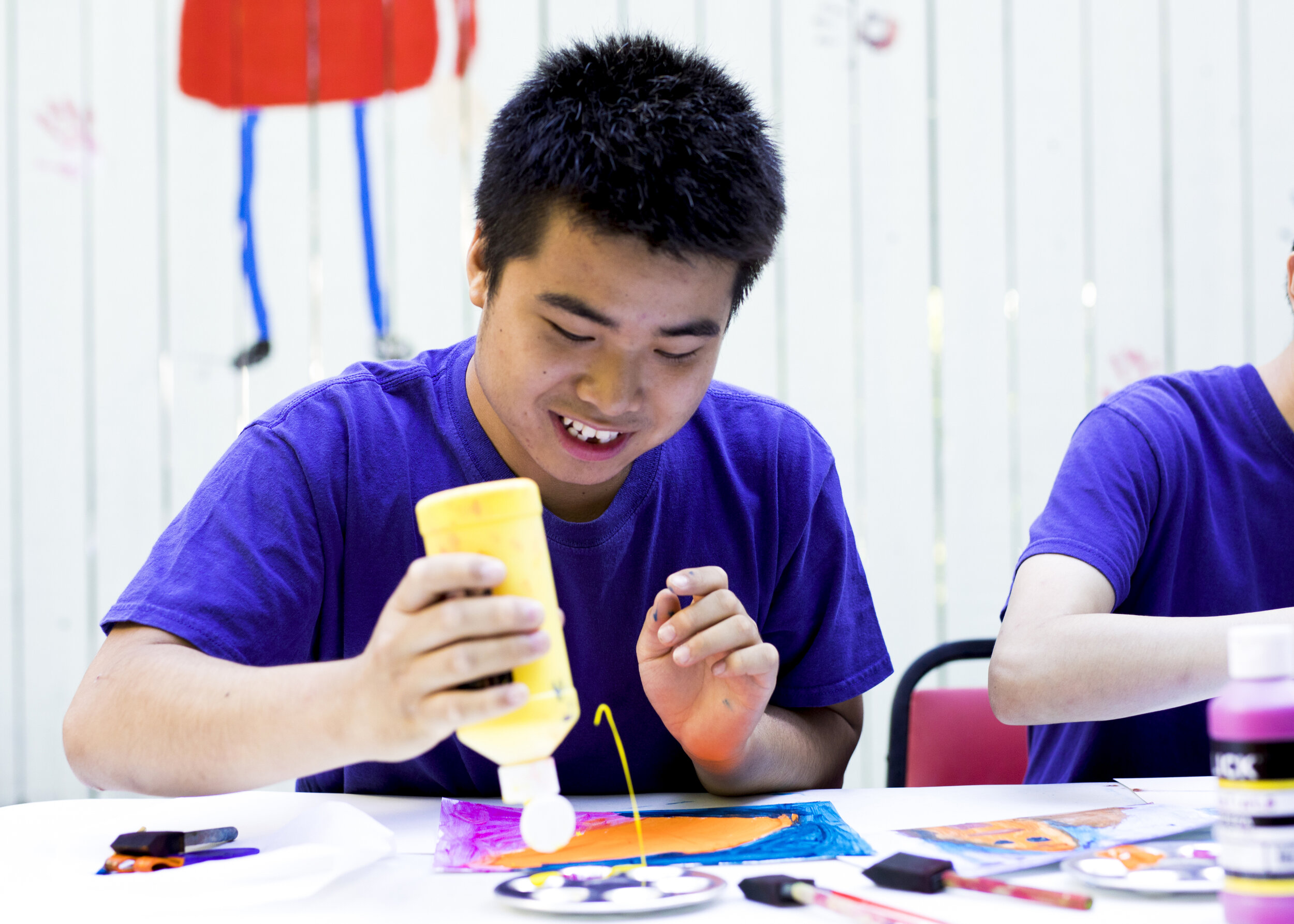
Fashion For Good
Designer, Co-Founder and COO- Jovana Mullins, discusses the challenges and rewards that came with starting a sustainable, social impact brand dedicated to working with designers with Autism.
Jovana, Brandon, Allen and their two models
The Fashion industry often gets a bad rep. Its frequently surrounded by negativity in regards to pollution and ethical issues. So it's a breath of fresh air when brands like Alivia burst onto the scene and shine a positive light onto the world of fashion. Alivia is not only focussed on sustainable fashion, they employ people with Autism throughout the design process.
Jovana Mullins, Co-founder and CCO of Alivia, began her career studying at the prestigious Parsons school of design in New York. After completing a series of internships both in the UK and US, she landed her first full time role in London with her dream designer- the flamboyant Matthew Williamson.
From there, Jovana eventually moved back to the states when she accepted a position in NYC at celebrity favorite - Alice and Olivia.
A role more focussed in print and embroidery at Sam Edelman took Jovana in a direction that was to later influence her decision to go solo as a freelance print & embroidery designer. After several years and a huge client base of well known luxury brands later, Jovana took the ultimate plunge and started Alivia with husband Brandon....
Hi Jovana! You have such an amazing story, we can't wait for you to share it with us...
As we mentioned, you have had a hugely successful career in the fashion industry so far, what made you decide to go freelance for a while after you left Sam Edelman?
After years of working in the Fashion Industry I felt burnt out due to the crazy hours and lack of freedom. Nothing inspired me anymore and I needed to take a break. I lacked time for other projects and what I was doing day to day didn’t feel impactful or rewarding enough. I loved designing, but I knew I wanted to pursue other passions too. I wanted to give back.
Volunteering is really important to me and I was only able to find the time to do it once a month, if even. When I left Sam Edelman and became solely freelance, I was able to make my own schedule, answer to myself and start volunteering regularly.
During this time you also did a lot of non profit work, teaching art therapy to developmentally disabled youths and young adults at New York's center for all abilities. How did you get involved in this and why was it important to you?
I had been volunteering at an organization called Gifted Hands since around 2014. Once a month I would lead a fashion related arts therapy class alongside a few other friends in the fashion industry. Gifted hands partners with different organizations like shelters and rehabilitation homes. We would go into a women’s shelter for ‘at risk women’, but unfortunately they closed down around 2017.
After doing a little research I found the Center for all Abilities through the organization Hope for New York. They have a network of nonprofits you can volunteer for and get involved in. I met with the founder to propose doing a ‘Gifted Hands’ session with them. When I met with her I was in love with everything they were doing and their whole mission. I’ve always had a passion for helping and working with people with disabilities, ever since I was young..
You launched your brand Alivia with your husband Brandon in January this year, tell us how it all began:
When I began volunteering at the Center for All Abilities I was doing art classes and mentoring programs with a small group of children and young male adults with autism ages 8-30 years old. As part of the art class I would go in to do painting with them. I was amazed at how talented they were - the artworks they created were so beautiful! Since individuals with autism are not always able to communicate as others do, I felt I was really getting to know them through their artworks instead. They have their own styles, their own creative visions, and they express who they are through art.
When I was looking at all the artworks they created, suddenly my mind was racing thinking ‘wow this could be a dress’ and ‘this could be a scarf’ because as a designer that’s how my mind always works. So I thought, hey, what if I created prints using their artwork! I told my husband Brandon and he was like ‘I think you’re onto something!’ He knew I hadn’t been happy with some of my experiences in the fashion industry since I met him, and we both saw that there was this huge gap in the market for a brand like this. A lot of other brands focus on social impact and sustainability which is great! But no one in Fashion is addressing the disabled communities.
So we started Alivia with the vision of working with Autistic artists to create beautiful prints and garments.
With many social impact brands we don’t always get to see what immediate positive impact our purchases have. Brandon and I wanted to find a way to connect the consumer instantly with the impact they were making from their purchase. We decided that 10% of every purchase would be donated to the Center for All Abilities, and we created scannable QR codes that are inside of every garment. You can scan the code and it will pull up a bio about the artist, and other artwork he’s created as well as being able to view where the 10% goes back to.
Was creating your own brand always part of your long term plan?
I think when I was little that was definitely the dream to have my own brand. When I actually got into the industry however, I quickly changed my mind when I realized how much work was involved. I also prefer being behind the scenes rather than at the forefront. But in the end everything aligned and clicked into place with Alivia. Even now I still think to myself this is a thousand times harder than I thought it would be. But I think because of the positive social impact Alivia has, it helps me to keep going knowing that this is for a bigger purpose instead of just pushing another Fashion Brand out there.
Describe to us what Alivia stands for as a brand and the ethos behind it:
The name Alivia stands for: Awareness, Love, Inclusion, Voice, Individuality and Acceptance which are our core values as a company and what we stand for. We really want to push the consumer to connect with their clothing and make thoughtful purchases all while bringing awareness to a greater cause and celebrating diversity and inclusion.
You have some incredibly talented print designers at Alivia, tell us a little more about them and their background:
So William Choi designed the prints for our first collection which is available now. He is 17 years old and his paintings are so bold and vibrant. His eye for color is unbelievable, some of the most amazing color combinations I’ve ever seen. He’s not afraid to go for it and he’s super quick and bold with his strokes too. He especially likes to paint geometric shapes.
Allen Li is another featured creator, he is the most joyful person I’ve ever met. He’s always happy and making jokes, he’s always so animated and his artwork really expresses that side of his personality.
Yu Chen - another featured artist is quite different from Alan and William in that he’s very methodical with his artwork. He’s very exact and realistic. He doesn't even have to look at a photograph, he paints realism purely from his mind! He’s obsessed with architecture, his main passion is building 3D models which he builds out of cardboard.
Alivia’s Artists
One of the reasons Alivia stands out so much as a brand is because it gives a voice to the developmentally disabled community. What other positive results have you seen so far from working with these organizations and individuals?
All 3 young men - Allen, William and Yu Chen have really come out of their shell and they’ve become a lot more confident. They’re very proud, especially when they got to see their prints on the clothing and see their signatures on the t-shirts. When they originally did the artwork and I was trying to explain what it was for, they didn't totally understand. But when the samples came back and they saw it in person they were just so proud. I think it’s also helped the families to see their children’s talents on display - showing the world what they can do beyond their disability.
Sustainability is also at the forefront of your brand. How do you implement sustainable practices in the workplace and in your product?
Our goal is to be as sustainable and ethical as possible. Our main fabric is GRS certified recycled polyester, and all of our mills are standard 100 Oeko-Tex approved which means they do not use harmful chemicals in their dyes during the printing and finishings of the fabrics. For all of our paper goods e.g. our hangtags and packaging, we use certified recycled paper. Our boxes and poly mailers are also recyclable.
Being completely honest, in the beginning it was really hard to navigate. The easy route would have been using all my previous factory and supplier contacts from brands I’ve worked at before. I wanted to make sure we were being sustainable, so I had to start from scratch. Finding a mill that would work with us on low minimums for prints was the hardest part. It took a lot of research and a lot of trial and error. Especially when figuring out their capabilities, pricing and location. We were so lucky to find the mill that we work with now. We work with a great factory in India, so half of our collection is made there and the other half is made here in New York.
None of our garments are going to waste either, if we have any inventory left over each season, we will still be selling them the following year, we will not be throwing anything away.
Starting your own brand can be a constant learning process, what key lessons have you learnt so far?
One major lesson I’ve learnt is that success doesn't happen overnight and to be patient. I’ve always been the type of person that wants to get things done and move onto the next goal. This process has really taught me to take a step back and realize I can’t control everything. Which also means you have to be flexible.
You can have all these great plans with everything mapped out, but situations like Covid-19 happen and you can’t change that. You have to learn to be able to navigate these situations when you’re not expecting them and be creative in your approach. With the recent protests for example, we had planned posts on our social media channels but it seemed so irrelevant and insensitive to be posting about a dress, when our country was fighting for justice. It just wasn’t the right time to be trying to sell a product.
Did you face any initial struggles or roadblocks at the beginning?
As any new company will tell you, there’s always a lot of challenges and roadblocks along the way.
I brought the idea for Alivia to my husband Brandon in October 2018. From there we really sat down and tried to work out what the brand could be, what gap in the market did it fill, what was the aesthetic, and what were our core values. Sourcing our factories was also top of our list, so it took us a while to build that.
That was then followed by product development, sourcing the fabrics, designing the collection and putting the prints together from William, Alan and Yu Chen's artworks.
One of the challenges we faced, and still face, is funding. We are 100% self funded to date through our savings, and I owe that a lot to my husband. He taught me a lot about the importance of saving and how to budget. .
Obviously with the pandemic, our sales projections have not gone to plan, so we are thinking of other creative ways to fund ourselves through revenue. If that means we aren't able to have a Fall collection this year, then that’s how it has to be. We had a lot planned for this year but unfortunately the pandemic had other ideas.
What are your future goals for Alivia?
We really want to build a fully inclusive supply chain, where we train people with disabilities and then employ them. As of now we are working with a non profit called Spectrum Designs. They produce our tees and tote bags, and train & employ people with autism to work at their facility. We want to continue creating partnerships like this, but also down the road have our own warehouse where we are able to train and employ ourselves.
Jovana with one of her artists, Allen
Another goal of ours is to eventually partner with influencers and celebrities who have siblings or friends with a disability, and create capsule collections with them. There are a lot of celebrities out there that have a direct connection to autism and already have their own foundations.
And lastly, what advice do you have for anyone starting their own brand?
It will be hard, but as long as you have a clear mission that you are passionate about and build your brand with integrity based on values you care about, it's completely worth it.
It takes a tonne of work. Everyday is a roller coaster - one minute you’re thinking ‘yay there’s an article about us in Forbes’ and the next minute you get the news that your Indian factory is closed for another month and you don’t know when you’ll receive your product.
But at the end of the day it's so rewarding, especially if you're working on a social impact brand. Whenever I get upset or discouraged I think about the three artists - William, Allen and Yu Chen. How excited and proud they were when they saw their artwork come to life in the finished product. That's what it's about for us. It's not about sales or how many followers we have. It's about our mission and bringing awareness to these talented individuals.
Thank you Jovana!
To check out the beautiful Summer 2020 collection at Alivia and find out more about the brand’s inspiring story head over to their website.
You can also follow them on instagram at alivia__brand
**Use our exclusive code F&TF10 to receive 10% off at Alivia! -Offer excludes masks.**
By Emma Golley














